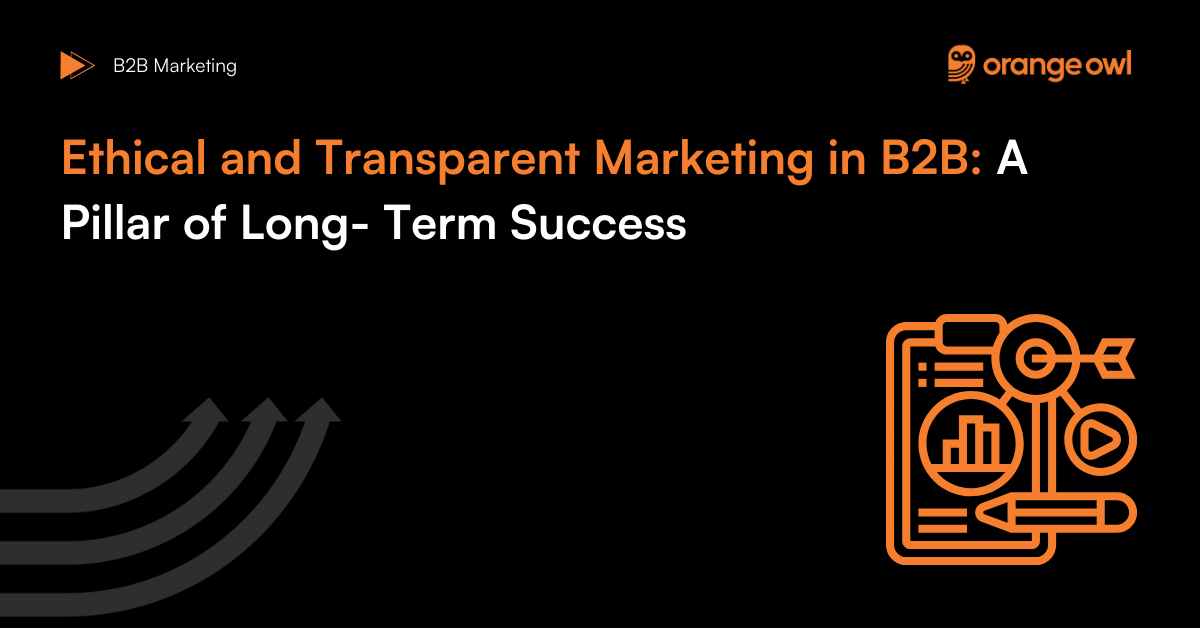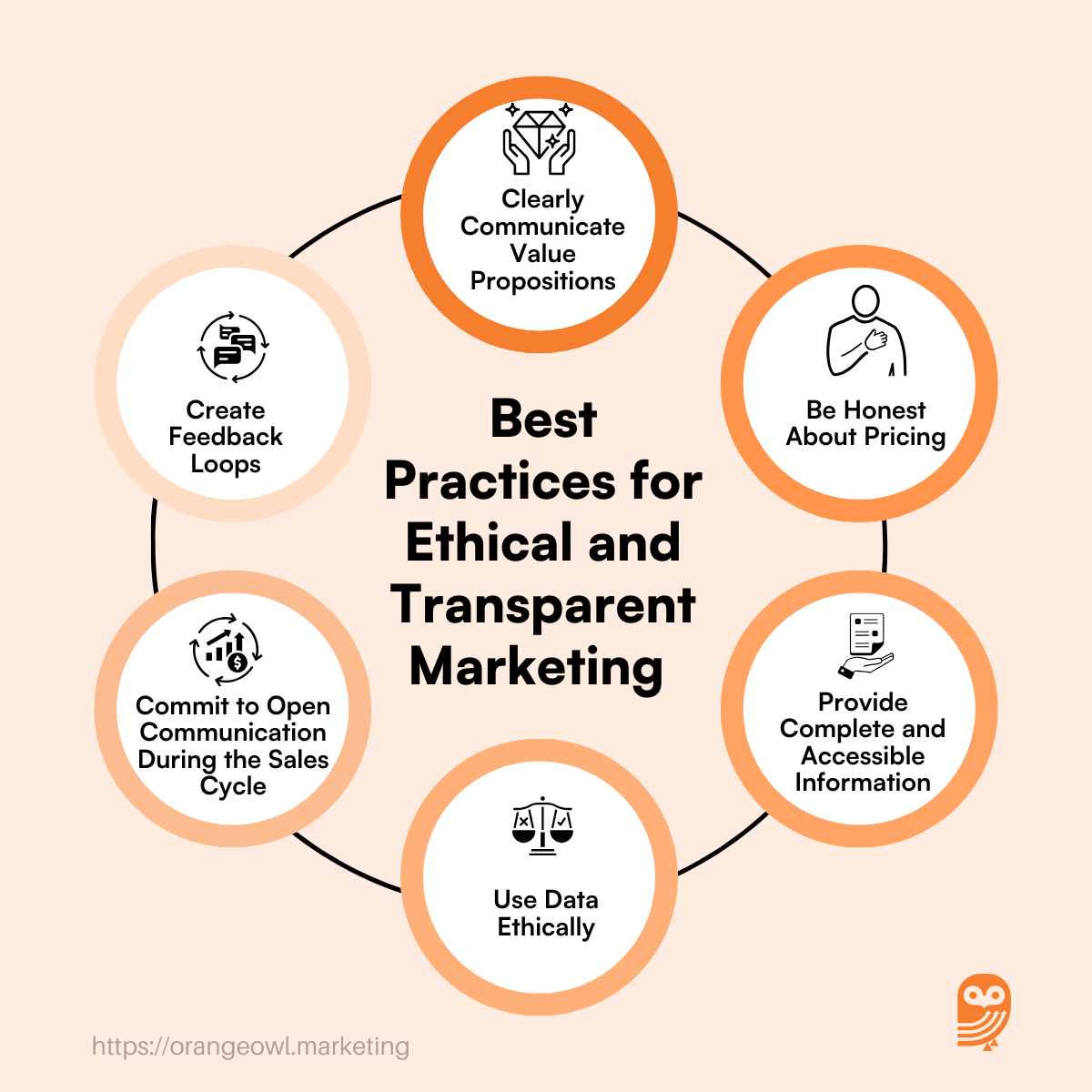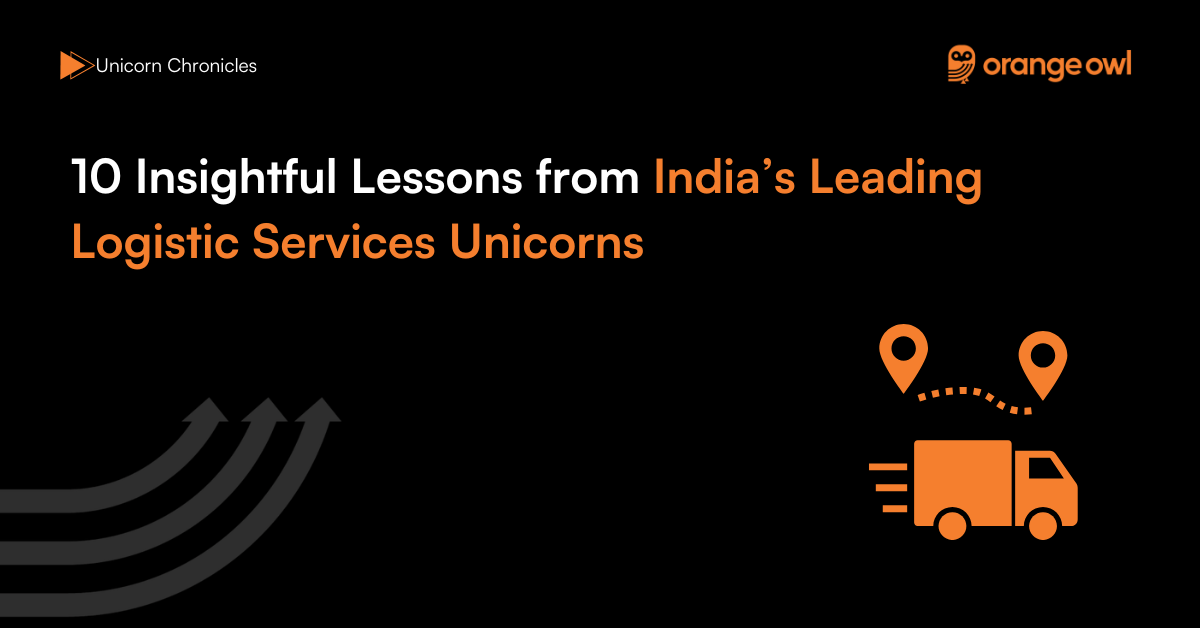Ethical and Transparent Marketing in B2B: A Pillar of Long-Term Success
Vivek Goel
December 24, 2024

Table of Contents
Introduction
In the fast-paced world of B2B marketing, trust is everything. Unlike B2C, where decisions are often driven by emotion or impulse, B2B transactions involve multiple stakeholders, longer sales cycles, and larger financial commitments. Ethical and transparent marketing is crucial in this context, as it builds credibility, strengthens partnerships, and drives sustainable growth.
This blog explores the importance, challenges, and best practices of adopting ethical and transparent marketing in B2B.
What is Ethical and Transparent Marketing in B2B?
Ethical marketing in B2B involves promoting products or services in a way that is truthful, fair, and socially responsible. Transparent marketing complements this by providing complete, clear, and accessible information about offerings, pricing, and business practices. Together, they foster a sense of accountability and mutual respect between businesses.
For example, being upfront about the limitations of a SaaS solution rather than overselling its capabilities ensures that clients make informed decisions, reducing dissatisfaction and churn.
Why Ethical and Transparent Marketing Matters in B2B
Ethical and transparent marketing is a virtue and a strategic imperative for B2B companies. It strengthens relationships, ensures compliance, and enhances operational efficiency, ultimately leading to long-term business success. Let’s delve deeper into why these principles are essential in the B2B context:
1. Builds and Sustains Trust
In B2B relationships, trust is foundational. Unlike B2C, where transactions can be one-off, B2B engagements often involve long-term commitments, larger financial stakes, and ongoing collaborations. Demonstrating ethical behaviour and transparency in your marketing efforts reassures potential and existing clients that you prioritize their best interests.
For example, sharing honest case studies or providing accurate data about the limitations of your services builds confidence. Trust cultivated through ethical practices leads to repeat business, higher customer lifetime value, and glowing referrals. In industries like technology, where companies depend on service providers for critical operations, trust is a non-negotiable asset.
2. Addresses Increasing Regulatory Scrutiny
Data privacy and ethical handling of client information are under the spotlight, with regulations such as the General Data Protection Regulation (GDPR), California Consumer Privacy Act (CCPA), and industry-specific compliance standards. Adhering to these regulations is not just a legal obligation but a moral one.
By being transparent about how you collect, store, and use client data, you reduce the risk of breaches or legal penalties while positioning yourself as a trustworthy partner. For instance, a SaaS company that openly explains its data protection protocols and offers clients the ability to control their information earns respect and loyalty. Ethical data management is a win-win, safeguarding your business while reassuring clients of their privacy.
3. Enhances Brand Reputation
In competitive B2B landscapes, reputation can make or break a company. Ethical marketing elevates your brand image by portraying your organization as credible, responsible, and customer-focused. Companies known for their integrity often outperform competitors when clients evaluate potential vendors.
For instance, a logistics provider that communicates accurate delivery timelines and cost estimates—even when facing potential delays—gains client respect. This honest approach reflects reliability, turning even challenging situations into opportunities to reinforce trust.
Over time, a strong reputation built on ethical practices becomes a significant competitive advantage, particularly in industries like finance, healthcare, or IT, where credibility is paramount.
4. Facilitates Better Decision-Making
Transparent communication in B2B marketing empowers clients to make informed decisions. Whether it’s providing detailed product specifications, offering clear ROI projections, or creating straightforward service-level agreements, transparency ensures that clients know exactly what they’re signing up for.
For example, an IT solutions provider might offer a detailed comparison of their software versus competitors’. This honesty, while acknowledging competitors’ strengths, demonstrates confidence in their own offering and helps clients choose the best fit for their needs.
Clients who feel well-informed during the decision-making process are more likely to remain satisfied with their choice, reducing buyer’s remorse and boosting retention rates.
What is the ROI of Ethical Marketing
The ROI (Return on Investment) of ethical marketing can be substantial, although it may not always be immediately quantifiable. Ethical marketing builds long-term value for a business by fostering trust, enhancing reputation, and driving sustainable growth. Below are key aspects of its ROI:
1. Increased Customer Retention and Loyalty
Ethical practices build trust, encouraging customers to remain loyal. Retaining existing customers is far more cost-effective than acquiring new ones. According to studies, increasing customer retention by just 5% can boost profits by 25-95%.
Example:
A B2B SaaS company that transparently communicates its pricing and product capabilities can earn client loyalty, reducing churn and increasing the lifetime value of the customer (CLV).
2. Enhanced Brand Reputation and Market Differentiation
Companies with ethical marketing practices are perceived as trustworthy and credible, helping them stand out in competitive markets. A strong reputation attracts high-value clients and premium partnerships, enabling better margins and reducing the cost of new customer acquisition.
Example:
A logistics company that transparently reports delays but works ethically to resolve them will gain a positive reputation, leading to more referrals and repeat business.
3. Reduced Legal and Compliance Costs
Adhering to ethical marketing practices ensures compliance with regulations like GDPR and CCPA. This reduces the risk of hefty fines, lawsuits, and reputational damage, which can cost millions.
Example:
In 2019, a global company was fined €50 million under GDPR for failing to comply with transparency requirements. Avoiding such penalties through ethical marketing saves significant resources.
4. Improved Employee Engagement and Productivity
According to Gallup, companies known for their ethical stance attract and retain top talent. Engaged employees who believe in the company’s values are 17% more productive and 21% more profitable.
Example:
A B2B consulting firm with a strong ethical brand will likely see higher employee morale and lower turnover rates, leading to better service delivery and lower recruitment costs.
5. Higher Conversion Rates
Ethical marketing practices foster trust during the buyer’s journey, improving conversion rates. Decision-makers in B2B often prioritize credibility, transparency, and long-term value over price alone.
Example:
A manufacturing solutions provider that provides an honest ROI calculator can boost conversions by demonstrating clear value to potential clients.
6. Long-Term Competitive Advantage
Ethical marketing fosters long-term relationships, driving consistent revenue streams. These sustainable practices create goodwill, which cushions businesses during economic downturns or market disruptions.
Example:
B2B brands like Salesforce, known for their ethical practices, maintain industry leadership and customer loyalty despite increasing competition.
Quantifying ROI in Numbers
While ethical marketing’s ROI is not always direct, metrics such as customer lifetime value (CLV), Net Promoter Score (NPS), churn rates, and brand equity growth can provide measurable indicators of success.
For example:
- If ethical marketing increases customer retention by 5% and your average customer contributes $10,000 annually, retaining 10 additional customers adds $100,000 to your bottom line.
- Avoiding a $1 million penalty for non-compliance through transparent practices directly impacts ROI.
6 Best Practices for Ethical and Transparent Marketing in B2B
Ethical and transparent marketing is a cornerstone of trust in B2B relationships. Companies that adopt these practices can strengthen their reputation, improve client loyalty, and navigate the complex regulatory environment effectively. Below is an in-depth look at best practices, along with real-world examples and actionable tips to help companies implement them.
1. Clearly Communicate Value Propositions
B2B buyers expect clear and honest communication about the value a product or service delivers. Misleading claims or overpromising can erode trust and result in dissatisfied clients.
Example:
Slack, a workplace communication tool, is transparent about its capabilities. Instead of claiming to “replace email entirely,” it emphasizes how it complements communication tools to improve team collaboration. This honest messaging aligns client expectations with actual outcomes.
Tips to Practice:
- Focus on outcomes: Highlight specific, measurable benefits rather than vague claims. For instance, “reduces project completion time by 20%” is more credible than “speeds up workflows.”
- Acknowledge limitations: Proactively communicate what your product or service does not cover. Clients will appreciate the honesty.
2. Be Honest About Pricing
Transparent pricing reduces friction during negotiations and builds trust. Many B2B deals involve customized solutions, but hiding fees or adding unexpected charges can damage relationships.
Example:
HubSpot, a CRM platform, displays its pricing structure clearly on its website, outlining costs for different plans, additional features, and optional add-ons. Prospective clients can estimate expenses without fear of hidden charges.
Tips to Practice:
- Use tiered pricing models: Offer clear pricing tiers with detailed inclusions for each level. This helps clients match their needs with their budgets.
- Provide a pricing calculator: Allow clients to estimate costs based on selected features or usage levels.
3. Provide Complete and Accessible Information
Transparent marketing involves making essential information easy to find. Clients should have access to product specifications, service limitations, case studies, and testimonials.
Example:
IBM provides detailed white papers, case studies, and user guides on its website, helping clients understand its offerings in depth before making a decision.
Tips to Practice:
- Create a knowledge base: Develop an online repository with FAQs, product demos, and troubleshooting guides.
- Leverage testimonials and case studies: Use real-world examples to showcase your impact while being transparent about challenges and outcomes.
4. Use Data Ethically
Ethical data handling is crucial in the age of privacy regulations like GDPR and CCPA. Misusing client data can lead to legal repercussions and erode trust.
Example:
Salesforce ensures GDPR compliance by providing clear data-handling policies and offering clients tools to manage their data securely. They emphasize transparency in how they collect and process information.
Tips to Practice:
- Obtain explicit consent: Use opt-in mechanisms for data collection and ensure clients can easily withdraw consent.
- Limit data collection: Collect only the data necessary for specific marketing activities and avoid overreach.
- Train teams: Regularly educate your marketing and sales teams on data protection regulations and ethical practices.
5. Commit to Open Communication During the Sales Cycle
Ethical marketing extends into the sales process. Be upfront about delivery timelines, implementation requirements, and after-sales support.
Example:
SAP, a global software solutions provider, is known for its detailed pre-sales consultations. It offers potential clients a clear roadmap of implementation timelines, required resources, and expected ROI before signing a deal.
Tips to Practice:
- Provide a roadmap: Offer a detailed plan that outlines steps, milestones, and responsibilities for both parties.
- Stay proactive: Maintain open communication throughout the sales and implementation process, updating clients on progress or potential delays.
6. Create Feedback Loops
Encourage clients to share feedback and address concerns promptly. Transparency also means being open to criticism and using it to improve.
Example:
Microsoft engages with its B2B customers through user feedback sessions and incorporates suggestions into product updates, ensuring clients feel heard and valued.
Tips to Practice:
- Use surveys and polls: Regularly gather client feedback through surveys and use the insights to refine your offerings.
- Acknowledge mistakes: If there’s a failure or miscommunication, take responsibility and provide a clear resolution plan.
Challenges in Ethical and Transparent Marketing in B2B
Ethical and transparent marketing is crucial for building trust and fostering long-term relationships in B2B settings. However, implementing these practices is not without its challenges. Below is an in-depth look at some of the most pressing issues and their implications.
1. Balancing Transparency with Competitive Advantage
While transparency is essential, disclosing too much information can inadvertently put a company at a disadvantage in the competitive landscape. For instance, sharing detailed pricing structures, product roadmaps, or operational processes might provide valuable insights to competitors, undermining strategic advantages.
Why It’s a Challenge:
- B2B buyers demand transparency: Decision-makers increasingly expect clear, upfront communication about costs, processes, and capabilities.
- Risk of commoditization: Excessive transparency might lead to a focus on price rather than value, turning a differentiated offering into a commodity.
Example:
A software-as-a-service (SaaS) company offering a detailed cost breakdown of its subscription pricing might face pressure from competitors who undercut their prices without offering similar value.
How to Address It:
- Share insights selectively by emphasizing value over cost. For example, focus on outcomes like efficiency or ROI rather than revealing proprietary methodologies.
- Use confidentiality clauses or NDAs during negotiations to safeguard sensitive information while being transparent with trusted partners.
2. Overcoming Legacy Practices
Many B2B companies have traditionally relied on opaque pricing models, hidden fees, or aggressive sales tactics. These legacy practices can create friction when transitioning to a more ethical and transparent marketing approach.
Why It’s a Challenge:
- Cultural inertia: Long-standing practices are deeply ingrained in company culture, and changing them requires a mindset shift at all organizational levels.
- Resistance to change: Teams accustomed to aggressive targets and opaque methods may resist new, more ethical approaches.
- Short-term impact on revenues: A shift to transparent practices may initially reduce revenue as clients reassess value propositions.
Example:
A manufacturing company that previously relied on bundling hidden fees into large contracts may struggle to retain customers when switching to a clear pricing model.
How to Address It:
- Start with leadership buy-in to drive change from the top down.
- Gradually transition legacy practices by piloting transparent models with select customers before rolling them out broadly.
- Communicate the long-term benefits of ethical practices to internal teams, such as improved client loyalty and reduced churn.
3. Educating Teams
Ensuring that marketing and sales teams understand and consistently implement ethical practices is critical but challenging. Misalignment or a lack of knowledge can lead to unintentional ethical breaches, damaging trust with clients.
Why It’s a Challenge:
- Varied interpretations of ethics: What constitutes “ethical” can differ across teams and regions, leading to inconsistent application.
- Evolving regulations: Keeping up with privacy laws and industry-specific regulations (e.g., GDPR, CCPA) requires continuous education.
- High-pressure environments: In aggressive sales-driven cultures, ethical practices might take a backseat to immediate revenue goals.
Example:
A sales representative unintentionally misrepresents product capabilities due to insufficient training, resulting in unmet client expectations and reputational harm.
How to Address It:
- Implement regular training sessions to educate teams on ethical marketing principles and current regulations.
- Create a code of conduct outlining acceptable practices and ensure every employee understands and adheres to it.
- Introduce checks and balances, such as pre-approving marketing materials or monitoring sales communications for compliance.
Examples of Ethical Marketing in B2B Companies
Ethical marketing is about more than compliance—it’s about fostering trust, building strong relationships, and creating value for customers. Some companies have excelled in adopting ethical marketing practices, setting themselves apart in their industries. Below are notable examples and insights into how these organizations have succeeded in creating transparent, customer-centric strategies.
1. Salesforce: Championing Data Privacy and Transparency
Salesforce, a global leader in CRM software, is known for its unwavering commitment to data privacy. The company complies with major data protection laws, such as GDPR and CCPA, and ensures its clients understand how their data is collected, stored, and used.
How They Set Themselves Apart:
- Customer Trust: Salesforce provides clients with tools like the “Salesforce Privacy Center,” enabling them to manage and control their data effectively.
- Transparent Communication: Regular updates on security practices and compliance reassure customers of their data’s safety.
- Ethical AI: Salesforce integrates AI ethically by following a set of principles that emphasize trust, equality, and accountability, ensuring the responsible use of AI-driven features.

Source: Salesforce
2. IBM: Prioritizing Thought Leadership and Accessibility
IBM exemplifies ethical marketing through transparency in its solutions and services. It publishes comprehensive white papers, case studies, and open-source tools, allowing customers to make informed decisions.
How They Set Themselves Apart:
- Open Knowledge Sharing: IBM’s commitment to open-source technologies and detailed case studies helps clients understand its offerings and decide on the right solutions for their needs.
- Environmental Responsibility: Through its sustainability reports and green initiatives, IBM transparently communicates its efforts to reduce environmental impact, appealing to ethically conscious clients.
- Clarity in Communication: IBM ensures that potential customers understand the full scope, limitations, and benefits of their solutions before committing.
3. HubSpot: Honest Pricing and Customer-Centric Content
HubSpot, a leader in marketing and sales software, is renowned for its transparent pricing and value-driven content. Its freemium model and accessible knowledge base make it stand out.
How They Set Themselves Apart:
- Freemium Model: HubSpot offers a free version of its platform with clear distinctions between free and paid features, enabling small businesses to benefit without financial commitment.
- Transparent Pricing: All costs, including optional add-ons, are clearly outlined on their website, avoiding any surprises during the sales process.
- Customer Education: HubSpot Academy provides free certifications and training, empowering businesses with the knowledge to succeed, even if they don’t use HubSpot’s products.
4. Patagonia: Ethics in Environmental Responsibility (B2B Apparel Division)
Patagonia applies its ethical marketing principles not only in consumer markets but also in its B2B partnerships, particularly in corporate apparel.
How They Set Themselves Apart:
- Environmental Advocacy: Patagonia emphasizes the sustainability of its products and shares data on the environmental impact of its materials and manufacturing processes.
- Purpose-Driven Messaging: The company encourages its B2B partners to align with their values, often turning down partnerships that don’t prioritize sustainability.
- Transparency in Manufacturing: Patagonia’s “Footprint Chronicles” allow businesses to see the supply chain journey of the products they purchase, ensuring they align with ethical sourcing standards.
Source: Patagonia
5. Unilever: Commitment to Ethical Supply Chains in B2B Relationships
Unilever, known for its consumer products, extends its ethical marketing principles to B2B partners, focusing on sustainable sourcing and fair trade.
How They Set Themselves Apart:
- Supplier Code of Conduct: Unilever requires its suppliers to adhere to strict ethical standards, promoting fair wages, safe working conditions, and environmentally friendly practices.
- Sustainability Reporting: Through detailed reports and updates, Unilever transparently communicates its progress on sustainability goals, helping partners align with their own corporate responsibility initiatives.
- Ethical Storytelling: The company uses compelling narratives to showcase how its products and partnerships drive positive social and environmental impact.
6. Accenture: Ethical AI and Transparent Consulting Practices
As a global consulting firm, Accenture has embraced ethical practices, particularly in its use of technology and AI-driven solutions for B2B clients.
How They Set Themselves Apart:
- Ethical AI Practices: Accenture actively collaborates with clients to develop AI solutions that are fair, transparent, and free from bias.
- Client Education: The firm ensures its clients fully understand the risks, benefits, and limitations of its recommended technologies before implementation.
- Sustainability Partnerships: Accenture’s sustainability consulting services help businesses transition to greener practices, backed by transparent methodologies and metrics.
7. Microsoft: Open Communication and Accessibility in Technology
Microsoft has built its reputation in B2B markets through clear communication and a commitment to accessibility, especially for its Azure cloud services and enterprise software solutions.
How They Set Themselves Apart:
- Accessibility: Microsoft designs its products with inclusivity in mind, ensuring businesses can accommodate diverse teams and customers.
- Open Communication: Clients are provided with clear insights into product updates, security protocols, and compliance certifications.
- Community Engagement: Microsoft uses its platform to educate businesses about ethical technology use through initiatives like the AI Business School.
Conclusion
Ethical and transparent marketing isn’t just about meeting regulatory requirements; it’s about fostering trust and creating lasting relationships in the B2B space. By clearly communicating value propositions, being upfront about pricing, sharing accessible information, handling data responsibly, maintaining open communication, and incorporating feedback, B2B companies can set themselves apart as trustworthy and forward-thinking partners. These practices ensure compliance and contribute to long-term success in an increasingly competitive market.
Frequently Asked Questions (FAQs) about Ethical and Transparent Marketing
Small B2B businesses can implement ethical marketing by prioritizing low-cost practices like clear communication, accurate product descriptions, and honest pricing. Leveraging free tools like customer feedback surveys and using social media to provide transparent updates can help build trust without significant financial investment.
Ethical marketing fosters long-term trust and loyalty, which cushions businesses during economic downturns. Clients are more likely to stick with trusted partners in challenging times, even if cheaper options are available. Transparency also reassures customers about a company’s stability and reliability.
Leadership sets the tone for ethical practices by modelling transparent behaviour, creating a code of ethics, and ensuring that ethical marketing aligns with company goals. Leaders must prioritize ethics over short-term gains and reward employees who uphold these values.
Ethical marketing can be integrated by providing clear and realistic expectations during sales pitches, offering transparent contract terms, and following up with honest post-sale communication. Training sales teams to prioritize customer needs over upselling also ensures ethical practices.
The impact of ethical marketing can be measured through metrics like Net Promoter Score (NPS), customer retention rates, brand sentiment analysis, and a reduction in customer complaints. Long-term indicators like market share growth and client referrals also reflect success.
Yes, ethical marketing can adapt to diverse cultural norms by emphasizing universally valued principles like honesty and fairness. Companies should conduct market research to understand local expectations and adjust communication styles while maintaining core ethical values.
Ethical marketing enhances vendor relationships by fostering mutual trust and accountability. Clear communication of expectations, fair contract terms, and transparency in pricing and performance metrics strengthen these partnerships, creating a win-win scenario.
In industries with frequent changes, companies can maintain transparency by providing regular updates, offering flexible contracts, and creating customer resources to navigate transitions. A commitment to open communication ensures clients remain informed and confident.
Potential risks include revealing too much competitive information or initial revenue drops when transitioning from opaque practices. These can be mitigated by strategically sharing information, emphasizing value over cost, and gradually implementing ethical practices to maintain financial stability.
To recover, a company should acknowledge past mistakes, apologize transparently, and take corrective action. Developing and communicating a clear code of ethics, training employees, and demonstrating consistent ethical behaviour over time can rebuild trust and credibility.




